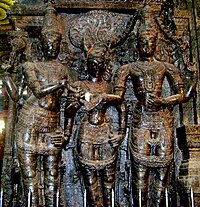Meenakshi

Meenakshi is an Avatar of the Hindu Goddess Parvati - and consort of Shiva - who is worshipped mainly by South Indians. She is also one of the few Hindu female deities to have a major temple devoted to her - the far famed Meenakshi Amman Temple in Madurai, Tamil Nadu. She is considered as a form of Goddess Lalitha Tripurasundari, one of the Dasa Maha Vidhyas.
Etymology
The word Meenakshi (eyes shaped like a fish, i.e., almond eyes) is derived from the Tamil word meen (fish) and the Sanskrit word akshi, or akshayam (eyes).

The legend
Once Indra killed a demon, even though the demon had not harmed anyone. This act brought a curse upon Indra that forced him to become a wanderer. As he wandered, Indra found himself lost, and nobody would tell him the way to redeem him from his sin. After much wandering Indra was freed from his suffering through the power of a Shivalingam in a forest, and so he built a small temple at that site.
The king was childless and sought an heir for the kingdom. Shiva granted him his prayers through an Ayonija child (one born not from the womb). This child was three years old and actually the incarnation of goddess Parvati the consort of Shiva. She was born with fish-shaped eyes and an extra breast . It was said that the extra breast would disappear when she met her future husband. She was named Meenakshi, (meaning fish eyed) from the words meen (meaning fish) and akṣhi (meaning eyes). Meenakshi also means "the one who has eyes like that of a fish". Fishes are said to feed their younger ones with their eyes, similarly goddess looks after her devotees. Just by her sight our miseries disappear.

She grew up to be a Shiva-Shakti personification. After the death of the king, she ruled the kingdom with skillful administration.
In one of her expeditions she went to the Himalayas and there, on seeing Shiva, her extra breast disappeared. Many of the gods and goddesses came to witness their marriage.

At the wedding celebrations the gods refused to have the served food unless Shiva performed a majestic dance for everybody gathered at the place. At this there was the dance of Chidambaram, the cosmic dance in front of his wife Meenakshi. It epitomised and merged all life force and beauty into one whole. In the end Meenakshi was merged with the shivalingam and became the representation of life and beauty.
There is another legend that talks about why the North Tower (called as "Mottai Gopuram") does not have that many sculptures. Bhootaganas were supposed to finish the construction of the temple towers during the night. Legend says that bhootaganas completed all three towers but while in the middle of building the north tower sunrise happened halting the completion of the north tower.
Meenakshi Devi
Meenakshi does not directly occur in the Lalita Sahasranama, though there is a reference to it in chalan meenabha lochana. Her eyes are fabled to bring life to the unborn.
The stotram Meenakshi Pancha Ratnam (five jewels of Meenakshi) [1], composed by Sri Adi Sankaracharya is an incantation to her. There are several other great hymns on the goddess, composed in the later centuries by many saints and scholars including the famous Neelakanta Dikshitar.
In thirty words, Meenakshi becomes a global icon for all who deal with 'impossible' children (or husbands).[1] Themes and activities of early childhood run through the poems. God in the little child is worshipped and protected amidst the toys in the kitchen and back yard.
References
- ^ Richman, Paula (1997). Extraordinary Child: Poems from a South Asian devotional genre. Honolulu: University of Hawai'i Press.

